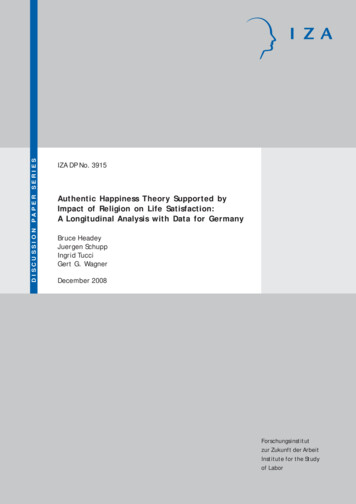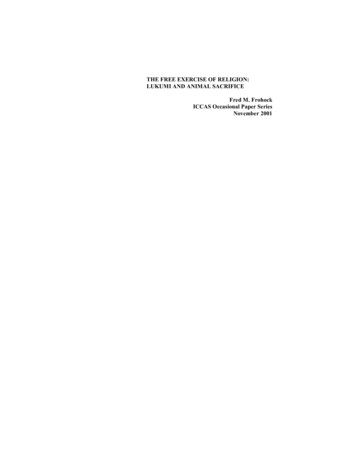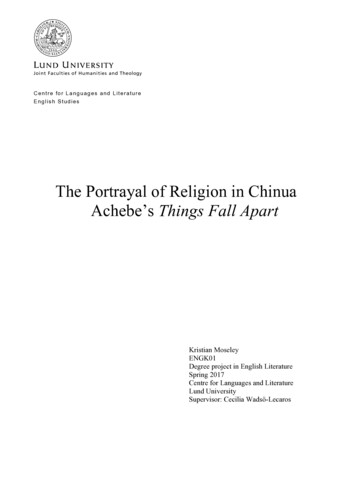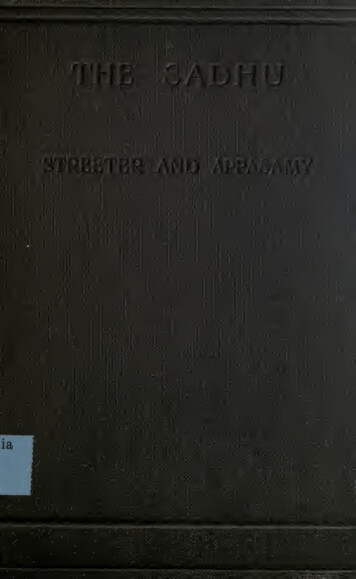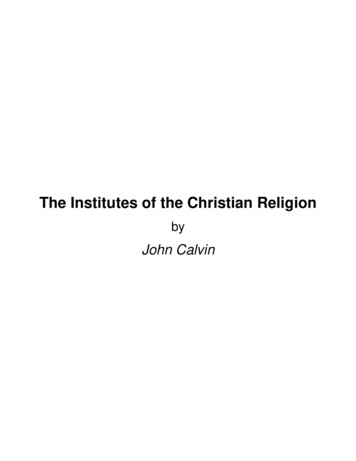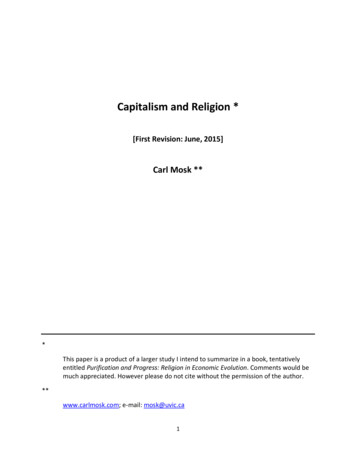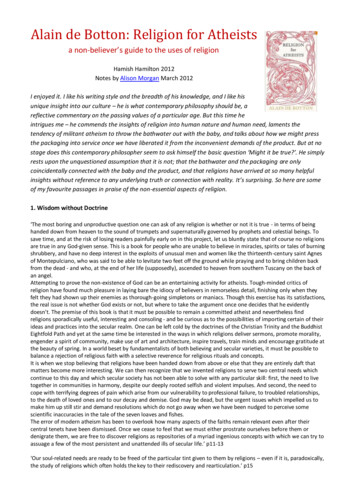
Transcription
Alain de Botton: Religion for Atheistsa non-believer’s guide to the uses of religionHamish Hamilton 2012Notes by Alison Morgan March 2012I enjoyed it. I like his writing style and the breadth of his knowledge, and I like hisunique insight into our culture – he is what contemporary philosophy should be, areflective commentary on the passing values of a particular age. But this time heintrigues me – he commends the insights of religion into human nature and human need, laments thetendency of militant atheism to throw the bathwater out with the baby, and talks about how we might pressthe packaging into service once we have liberated it from the inconvenient demands of the product. But at nostage does this contemporary philosopher seem to ask himself the basic question ‘Might it be true?’. He simplyrests upon the unquestioned assumption that it is not; that the bathwater and the packaging are onlycoincidentally connected with the baby and the product, and that religions have arrived at so many helpfulinsights without reference to any underlying truth or connection with reality. It’s surprising. So here are someof my favourite passages in praise of the non-essential aspects of religion.1. Wisdom without Doctrine‘The most boring and unproductive question one can ask of any religion is whether or not it is true - in terms of beinghanded down from heaven to the sound of trumpets and supernaturally governed by prophets and celestial beings. Tosave time, and at the risk of losing readers painfully early on in this project, let us bluntly state that of course no religionsare true in any God-given sense. This is a book for people who are unable to believe in miracles, spirits or tales of burningshrubbery, and have no deep interest in the exploits of unusual men and women like the thirteenth-century saint Agnesof Montepulciano, who was said to be able to levitate two feet off the ground while praying and to bring children backfrom the dead - and who, at the end of her life (supposedly), ascended to heaven from southern Tuscany on the back ofan angel.Attempting to prove the non-existence of God can be an entertaining activity for atheists. Tough-minded critics ofreligion have found much pleasure in laying bare the idiocy of believers in remorseless detail, finishing only when theyfelt they had shown up their enemies as thorough-going simpletons or maniacs. Though this exercise has its satisfactions,the real issue is not whether God exists or not, but where to take the argument once one decides that he evidentlydoesn't. The premise of this book is that it must be possible to remain a committed atheist and nevertheless findreligions sporadically useful, interesting and consoling - and be curious as to the possibilities of importing certain of theirideas and practices into the secular realm. One can be left cold by the doctrines of the Christian Trinity and the BuddhistEightfold Path and yet at the same time be interested in the ways in which religions deliver sermons, promote morality,engender a spirit of community, make use of art and architecture, inspire travels, train minds and encourage gratitude atthe beauty of spring. In a world beset by fundamentalists of both believing and secular varieties, it must be possible tobalance a rejection of religious faith with a selective reverence for religious rituals and concepts.It is when we stop believing that religions have been handed down from above or else that they are entirely daft thatmatters become more interesting. We can then recognize that we invented religions to serve two central needs whichcontinue to this day and which secular society has not been able to solve with any particular skill: first, the need to livetogether in communities in harmony, despite our deeply rooted selfish and violent impulses. And second, the need tocope with terrifying degrees of pain which arise from our vulnerability to professional failure, to troubled relationships,to the death of loved ones and to our decay and demise. God may be dead, but the urgent issues which impelled us tomake him up still stir and demand resolutions which do not go away when we have been nudged to perceive somescientific inaccuracies in the tale of the seven loaves and fishes.The error of modern atheism has been to overlook how many aspects of the faiths remain relevant even after theircentral tenets have been dismissed. Once we cease to feel that we must either prostrate ourselves before them ordenigrate them, we are free to discover religions as repositories of a myriad ingenious concepts with which we can try toassuage a few of the most persistent and unattended ills of secular life.’ p11-13‘Our soul-related needs are ready to be freed of the particular tint given to them by religions – even if it is, paradoxically,the study of religions which often holds the key to their rediscovery and rearticulation.’ p15
‘In the course of ridding ourselves of unfeasible ideas, we have unnecessarily surrendered some of the most useful andattractive parts of the faiths.’ p17.‘Atheists of the militant kind may also fed outraged, in their case by a book that treats religion as though it deserves tobe a continuing touchstone for our yearnings. They will point to the furious institutional intolerance of many religions,and to the equally rich, though less illogical and illiberal, stores of consolation and insight available through art andscience. They may additionally ask why anyone who professes himself unwilling to accept so many facets of religion who feels unable to speak up in the name of virgin births, say, or to nod at the claims reverently made in the Jataka talesabout the Buddha's identity as a reincarnated rabbit - should still wish to associate himself with a subject ascompromised as faith.To this the answer is that religions merit our attention for their sheer conceptual ambition; for changing the world in away that few secular institutions ever have. They have managed to combine theories about ethics and metaphysics witha practical involvement in education, fashion, politics, travel, hostelry, initiation ceremonies, publishing, art andarchitecture - a range of interests which puts to shame the scope of the achievements of even the greatest and mostinfluential secular movements and individuals in history. For those interested in the spread and impact of ideas, it is hardnot to be mesmerized by examples of the most successful educational and intellectual movements the planet has everwitnessed.’ p182. CommunityOne of the losses modern society feels most keenly is that of a sense of community. IT’s often linked with theprivatization of religious belief- historians have suggested that we began to disregard our neighbours ataround the same time as we ceased communally to honour our gods. But some of it is just sheer numbers –there are too many of us, and too many of our engagements are impersonal. We no longer need to rely onother people for help, we are frightened by what the media tell us about the violence and depravity of others,and we are encouraged to embark on a maniacal quest for a single person with whom we hope to achieve alifelong, complete and sufficient communion. Many of us throw ourselves into our careers instead, and hopeto get our needs met there.The Church knows about loneliness, it creates community, it invites us to be happy without having to besuccessful, it deals with our fears and offers us the respect and security we crave through a warm andimpressive community which imposes no worldly requirements on us for its welcome. NB it was not until AD364 that the Church banned agape feasts (they’d become excessive and rowdy) in favour of eating at homeand then coming to a ritualised meal which we know as the Eucharist (p39). It’s odd we have so few publicvenues which help us turn strangers into friends – we need to adapt the Mass into an all-comers AgapeRestaurant, where people can meet one another through dining together.It’s not just how to form community that religions are good at, it’s how to handle things when they go wrong.Judaism in particular is good at anger – an annual Day of Atonement on which people are supposed to seekforgiveness from all they may have hurt over the last year.Religions also offer rituals to build and maintain community in the face of difficulty – funerals, Bar Mitzvahs,the medieval Feast of Fools.3. KindnessWe are seldom encouraged officially to be nice to one another. It offends our libertarian beliefs and riskspaternalism. JS Mill said the only grounds for state interference in people’s lives is to prevent them harmingothers – not for their own good. Religions however have never held back. Libertarians doubt we can knowwhat virtue is, or how to instil it in others – they have no moral bedrock. The only exception is childrearing,where parents do favour intervention over neutrality in their desire to bring up their children. And yet theresults are not good – freedom does not always bring only good things; ‘our deepest wish may be thatsomeone would come along and save us from ourselves.’Religions however do offer guidance on how to live. They know that to sustain goodness we need anaudience – it helps to know someone is watching (most marriages would work better if we thought that!).Clergy may tend to speak as if they alone were in possession of maturity and moral authority – but Christianityacknowledges that we are actually all infantile, incomplete and unfinished – an d calls it Original Sin. It creates
a moral atmosphere in which people point out their flaws to one another and look for improvement in theirbehaviour. Fresco painters put up virtues and vices as models and warnings – eg Scrovegni Chapel. Whatwould it be like if we had similar images on advertising hoardings – eg advocating Forgiveness?Atheists tend to pity the inhabitants of religiously dominated societies for the extent of the propaganda they have toendure, but this is to overlook secular societies' equally powerful and continuous calls to prayer. A libertarian state trulyworthy of the name would try to redress the balance of messages that reach its citizens away from the merelycommercial and towards a holistic conception of flourishing. True to the ambitions of Giotto's frescoes, these newmessages would render vivid to us the many noble ways of behaving that we currently admire so much and so blithelyignore We don't only need reminders of the advantages of savoury snacks. p88Religions also offer role models in saintsWhile paying attention to the messages in its public spaces, Christianity also wisely recognizes the extent to which ourconcepts of good and bad are shaped by the people we spend time with. It knows that we are dangerously permeablewith regard to our social circle, all too apt to internalize and mimic others' attitudes and behaviour. Simultaneously, itaccepts that the particular company we keep is largely a result of haphazard forces, a peculiar cast of characters drawnfrom our childhood, schooling, community and work. Among the few hundred people we regularly encounter, not verymany are likely to be the sorts of exceptional individuals who exhaust our imagination with their good qualities, whostrengthen our soul and whose voices we want consciously to adopt to bolster our best impulses.The paucity of paragons helps to explain why Catholicism sets before its believers some two and a half thousand of thegreatest, most virtuous human beings who, it feels, have ever lived. These saints are each in their different waysexemplars of qualities we should hope to nurture in ourselves. St Joseph, for instance, may teach us how to cope calmlywith the pressures of a young family and how to face the trials of the workplace with a modest and complaining temper.There are moments when we may want to break down and sob in the company of St Jude, patron saint of lost causes,whose gentle manner can grant us comfort without any need to find immediate solutions or even hope 92-93And it offers an equivalent of teddies in the form of little statues and icons of saints. ‘A well functioningsecular society would think with similar care about its role models. It would not only provide us with film starsand singers’ – we still need ‘patron saints’ who model courage, friendship, fidelity etc – how about Lincoln,Churchill, Paul Smith?4. EducationSecular society believes fervently in education – but about odd things, like the professor who has spent 20years researching the cause of declining crop yields between 1742 and 1798; or the students examining theuse of natural imagery in Horace and Petronius. University academics are intensely committed to their tasks –and yet the modern university appears to have little interest in teaching emotional or ethical life skills, muchless how to love their neighbours and leave the world happier than they found it. Scripture used to do this;and since the C19th the hope has been that culture could replace scripture in helping people find meaning,understand themselves, behave morally, forgive others and confront their own mortality. So we could turn toMarcus Aurelius, Boccaccio, Wagner and Turner instead. It’s an odd proposition – but maybe not so muchabsurd as unfamiliar. Novels do impart moral instruction; paintings do make suggestions about happiness;literature can change our lives, philosophy can offer consolations. But while universities have achievedunparalleled expertise in imparting factual info about culture, they remain uninterested in training students touse it as a repertoire of wisdom. ‘So opposed have many atheists been to the content of religious belief thatthey have omitted to appreciate its inspiring and still valid overall object: to provide us with well-structuredadvice on how to lead our lives.’ 111.Christianity meanwhile looks at the purpose of education from another angle, because it has an entirely differentconcept of human nature. It has no patience with theories that dwell on our independence or our maturity. It insteadbelieves us to be at heart desperate, fragile, vulnerable, sinful creatures, a good deal less wise than we areknowledgeable, always on the verge of anxiety, tortured by our relationships, terrified of death - and most of all in needof God.What sort of education might benefit such forlorn wretches? While the capacity for abstract thought is considered byChristianity to be in no way dishonourable, and indeed even a potential sign of divine grace, it is held to be of secondaryimportance to a more practical ability to bring consoling and nurturing ideas to bear on our disturbed and irresoluteselves.
We are familiar enough with the major categories of the humanities as they are taught in secular universities – historyand anthropology, literature and philosophy - as well as with the sorts of examination questions they produce: Who werethe Carolingians? Where did phenomenology originate? What did Emerson want? We know too that this scheme leavesthe emotional aspects of our characters to develop spontaneously, or at the very least in private, perhaps when we arewith our families or out on solitary walks in the countryside.In contrast, Christianity concerns itself from the outset with the inner confused side of us, declaring that we are none ofus born knowing how to live; we are by nature fragile and capricious, unempathetic and beset by fantasies ofomnipotence, worlds away from being able to command even a modicum of the good sense and calm that seculareducation takes as the starting point for its own pedagogy.Christianity is focused on helping a part of us that secular language struggles even to name, which is not preciselyintelligence or emotion, not character or personality, but another, even more abstract entity loosely connected with allof those and yet differentiated from them by an additional ethical andtranscendent dimension - and to which we may as well refer, following Christian terminology, as the soul. It has been theessential task of the Christian pedagogic machine to nurture, reassure, comfort and guide our souls. p112-13Wesley used to preach on being kind, staying obedient to parents, visiting the sick, caution against bigotry. Hesaid ‘I design plain truth for plain people: therefore I abstain from all nice and philosophical speculations;from all perplexed and intricate reasonings; and as far as possible, from even the show of learning. My designis to forget all that ever I have read in my life.’ 120. ‘We on the other hand have constructed an intellectualworld whose most celebrated institutions rarely consent to ask, let alone answer, the most serious questionsof the soul.’ 121 Maybe we need a new kind of university, one which had a dept for relationships, an instituteof dying and a centre for self knowledge.Then there’s the method – impassioned preaching makes a difference to the engagement and impact. ‘Seculareducation will never succeed in reaching its potential until humanities lecturers are sent to be trained byAfrican-American Pentecostal preachers.’ 131.Ideas need not just to be presented, but also repeated. The Christian calendar does this, as does the set dailyliturgy. Secular society leaves us free, presenting us with a constant stream of new information, andprompting us to forget the lot. It expects us to spontaneously find our way to the ideas that matter to us, andgives us weekends off for consumption and recreation. It’s the ‘news’ which occupies the position of authorityin the secular sphere which the liturgical calendar has in the religious one. Matins ahs become the breakfastbulletin, vespers the evening report. Its prestige is founded on the assumptions that our lives are poised onthe verge of transformation due to the 2 driving forces of modern history: politics and technology. Religioustexts, by contrast, are written on stone, books are few and thoroughly absorbed.The importance of body posture is also something religions take seriously, and secular education does not.Summary: Religions teach wisdom; secular societies offer information.5. TendernessA man in a church, praying to Mary, going out feeling better. We long to be held and comforted; prayer doesthat.By contrast with religion, atheism is prone to seem coldly impatient with our neediness. The longing for comfort whichlies at the heart of the Marian cult seems perilously regressive and at odds with the rational engagement with existenceon which atheists pride themselves. Mary and her cohorts have been framed as symptoms of urges which adults oughtquickly to outgrow.At its most withering and intellectually pugnacious, atheism has attacked religion for blinding itself to its own motives,for being unwilling to acknowledge that it is, at base, nothing more than a glorified response to childhood longings whichhave been dressed up, recast in new forms and projected into the heavens.This charge may well be correct. The problem is that those who level it are themselves often involved in a denial, a denialof the needs of childhood. In their zeal to attack believers whose frailties have led them to embrace the supernatural,atheists may neglect the frailty that is an inevitable feature of all our lives. They may label as childish particular needswhich should really be honoured as more generally human, for there is in truth no maturity without an adequatenegotiation with the infantile and no such thing as a grown-up who does not regularly yearn to be comforted like a child.173
6. PessimismWe should honour Pascal, and the long line of Christian pessimists to which he belongs, for doing us the incalculably great favour ofpublicly and elegantly rehearsing the facts of our sinful and pitiful state. 181Despite occasional moments of panic, most often connected to market crises, wars or pandemics, the secular age maintains an all butirrational devotion to a narrative of improvement, based on a messianic faith in the three great drivers of change: science, technologyand commerce. Material improvements since the mid-eighteenth century have been so remarkable, have so exponentially increasedour comfort, safety, wealth; power, as to deal an almost fatal blow to our capacity to remain pessimistic - and therefore, crucially, toour ability to stay sane and content. It has been impossible to hold on to a balanced assessment of what life is likely to provide for uswhen have witnessed the cracking of the genetic code, the invention of the mobile phone, the opening of Western-style supermarketsin remote corners of China and the launch of the Hubble telescope.Yet while it is undeniable that the scientific and economic trajectories of mankind have been pointed firmly in an up direction forseveral centuries, we do not comprise mankind: none of us individuals can dwell exclusively amidst the ground-breaking developmentsin genetics or telecommunications that lend our age its distinctive and buoyant prejudices. We may derive some benefit from theavailability of hot baths and computer chips, but our lives are no less subject to accident, frustrated ambition, heartbreak, jealousy,anxiety or death than were those of our medieval forebears. But at least our ancestors had the advantage of living in a religious erawhich never made the mistake of f promising its population that happiness could ever make a permanent home for itself on this earth.182-83The secular are at this moment in history a great deal more than the religious - something of an irony, given the frequency with whichthe latter have been derided by the former for their apparent naivety and credulousness. It is the the secular whose longing forperfection has grown so intense as to lead them to imagine that paradise might be realized on this just a few more years of financialgrowth and medical research. With no evident awareness of the contradiction they may, in the same breath, gruffly dismiss a belief inangels while sincerely trusting that the combined powers of the IMF, the medical research establishment, Silicon Valley anddemocratic politics could together cure the ills of mankind. 183 & 85It is the most ambitious and driven among us who are the most sorely in need of having our reckless hopes dampened throughimmersive dousings in the darkness which religions have explored. This is a particular priority for secular Americans, perhaps the mostanxious and disappointed people on earth, for their nation infuses them with the most extreme hopes about what they may be able toachieve in their working lives and relationships. We should cease to view the pessimism of religions as belonging to them alone, or asindelibly dependent on hopes for salvation. We should strive to adopt the acute perspective of those who believe in paradise, even aswe live out our own lives abiding by the fundamental atheistic precept that this is the one world we will ever know.185A pessimistic worldview does not have to entail a life stripped of joy. Pessimists can have a far greater capacity for appreciation thantheir opposite numbers, for they never expect things to turn out well and so may be amazed by the modest successes whichoccasionally break across their darkened horizons. Modern secular optimists, on the other hand, with their well-developed sense ofentitlement, generally fail to savour any epiphanies of everyday life as they busy themselves with the construction of earthly paradise.Accepting that existence is inherently frustrating, that we are forever hemmed in by atrocious realities, can give us the impetus to say'Thank you' a little more often. It is telling that the secular world is not well versed in the art of gratitude: we no longer offer up thanksfor harvests, meals, bees or clement weather. On a superficial level, we might suppose that this is because there is no one to say'Thank you' to. But at base it seems more a matter of ambition and expectation. Many of those blessings for which our pious andpessimistic ancestors offered thanks, we now pride ourselves on having worked hard enough to take for granted. Is there really anyneed, we wonder, to carve out a moment of gratitude in honour of a sunset or an apricot? Are there not loftier goals towards whichwe might be aiming? 1887. Perspective‘Religion is above all a symbol of what exceeds us and an education in the advantages of recognizing our paltriness.Being put in our place by something larger, older, greater than ourselves is not a humiliation; it should be accepted as arelief from our insanely hopeful ambitions for our lives’ 200.Reminders of transcendence are helpful in providing perspective – maybe we should have public images ofgalaxies set up to remind us how small we are.8. ArtSome atheists find it hard to give up the beauty and emotion of ecclesiastical art – and strive to findalternatives. Museums of art have become our new churches; like universities, they promise to fill the gapsleft by the ebbing of faith; they give us meaning without superstition. Secular books can replace the gospels;and so museums may be able to take over the aesthetic responsibilities of churches.Why should art matter? It’s a forbidden question. Museums display it in hushed galleries, but do notencourage us to ask any religious questions about it – even religious art is stripped of its theological content.We are encouraged to respond to art by becoming knowledgeable about it, not by reacting to it. We aresupposed to understand it, not be transformed by it. Christianity has never left any doubt what art is for – to
remind us about what matters. Hegel defined art as ‘the sensuous presentation of ideas’; ideas, particularly,which matter to the proper functioning of our souls. Eg the focus in Christian art on suffering helps us to bearit, to know we are not alone in it; art gives shape to pain, and thus attenuates the worst of our feelings ofisolation. Perhaps art galleries should offer secular images as a modern equivalent of the 14 stations of thecross – a depressed girl, a disabled man. Art shows us that ‘other people are just altered versions of ourselves:fellow fragile, uncertain, flawed beings likewise craving love and in urgent need of forgiveness’ – 227.Christian art has a mission; to offer virtues and vices and remind us of what is important but easily forgotten.NB it never left its artists to decide what art should be about – theologians did that. No one assumed thattalent was compatible with the ability to work out the meaning of life. Titian was not expected to be a greatphilosopher. The Romantic belief that greatness must involve constant originality at a thematic level hasbrought great harm.How about a Tate Modern with galleries devoted to suffering, compassion, fear, love, self knowledge? Thus amuseum really could be our new church, rather than just a place for displaying beautiful objects.9. ArchitectureReligious architecture mitigates our egoism by showing us our own insignificance. So could secular buildings.‘It is one of the unexpected disasters of the modern age that our new unparalleled access to information hascome at the price of our capacity to concentrate on anything much’ – 264. We are never far from a machinethat guarantees a mesmerising escape from reality. We need places where that’s not happening – with views,sounds, simplicity. We need modern temples to reflection, places where we can find the solitude we need tothink about things, capture ‘those rare insights upon which the successful course of our life depends, butwhich normally run across our distracted minds only occasionally and skittishly like shy deer.’ 267Religions, both Roman and Christian, allow for sacred places with curative powers. We suffer from a lack ofshrines. We travel, but our travelling lacks any therapeutic purpose.10. InstitutionsSecular intellectuals suffer from a suspicion of institutions, rooted in the Romantic world view – but isolatedthey can’t disseminate their ideas effectively, and are doomed to achieve very little. We need to createsecular entities that can meet the needs of the inner self with the skill that corporations currently apply tosatisfying the needs of the outer.Brands promote consistency and create a shared visual vocabulary – both religions and commercialorganisations do this. How about a brand of psychotherapists called Talking Cure?Auguste Comte recognised that secular society needs its own institutions, ones that cold take the place ofreligions by addressing human needs which fall outside the existing remits of politics, the family, culture andthe workplace. He said good ideas would not be able to flourish if left inside books; they have to be supportedby institutions. It never got off the ground – but maybe it should.Note – small print (10pt) is direct quotes.11pt is summary unless given in inverted commas.Alison Morganwww.alisonmorgan.co.uk
Alain de Botton: Religion for Atheists a non-believer [s guide to the uses of religion Hamish Hamilton 2012 Notes by Alison Morgan March 2012 I enjoyed it. I like his writing style and the breadth of his knowledge, and I like his unique insight into our
